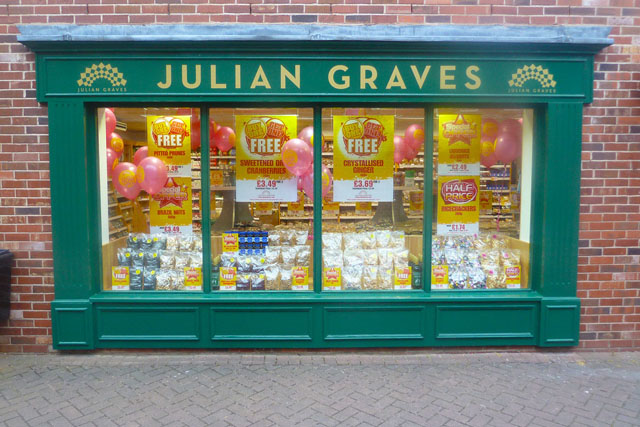Obesity levels and the importance of healthy eating is rarely out of the headlines, particularly in the run-up to London 2012.
The message, however, has not had the desired impact on the health-food retail market; earlier this month, Julian Graves collapsed into administration, putting the future of its 755 employees in doubt.
The retailer, which is based in Nuneaton, Warwickshire, specialises in selling dried fruit, snacks and nuts, as well as offering traditional sweets.
It was acquired by parent company NBTY from the defunct Icelandic investment vehicle Baugur in 2008.
In the past four years, however, Julian Graves has failed to make a profit. NBTY also owns health-food chain Holland & Barrett, which focuses on vitamins and supplements, and posted encouraging results earlier this month.
NBTY says Julian Graves has been adversely affected by the sharp drop in consumer spending and rising commodity prices. It is thought that high nut prices, in particular, were difficult to pass on to shoppers.
The retailer has also been faced with an increasingly competitive marketplace. The health-food market has become crowded in recent years, with supermarkets, Chinese medicine specialists and online retailers competing for a share of consumer spend. Supermarkets, in particular, are targeting both the premium and bottom end of the market.
The retailer is continuing to trade while administrator Deloitte assesses its financial situation and options available. Can such a business be sustained in the current economic climate, however?
We asked Jon Goldstone, former group marketing director at Premier Foods, and Phil Wright, chairman of agency Chapter and founder of Big Communications, which handles the Holland & Barrett account.
JULIAN GRAVES STATS
Julian Graves has 189 shops
It has reportedly made a loss of £2m a year since 2008
JOHN GOLDSTONE, FORMER GROUP MARKETING DIRECTOR, PREMIER FOODS
Now there's a challenge - how to turn around the fortunes of a health-food chain that has gone into administration, having posted a loss for the past four years?
To add to the difficulty, its sister company, but soon to be competitor, Holland & Barrett, has just posted pre-tax profits of £60m - a 19% rise on last year.
How might a buyer create some value? Surely there must be an opportunity here. As a nation, we continue to obsess about health and diet, and the media is saturated with articles and programmes about super-foods and wonder diets.
Yet specialist health-food retailers have struggled to make their mark.
Despite its healthy profits, I find Holland & Barrett a very odd place to shop, and Whole Food Market's UK proposition seems to be far too niche.
REMEDY
- Organise the brand around a simple idea that tells its customers what it exists for and is linked into the founding philosophy. Something like natural vitality: 'We're the experts at helping you feel healthy and energetic through the products we sell and the services we offer.'
- Design activities around this idea. This should determine which stores continue to trade and which lines to stock and services to offer.
- Significantly step up the online presence. There is an opportunity to create a one-stop service that offers a combination of healthy natural food and expert help on diet and exercise.
PHIL WRIGHT, CHAIRMAN, CHAPTER
Julian who? The harshest winters put paid to the sick and the infirm, and Julian Graves, sadly, falls into this category. At the risk of sounding like Victor Meldrew, I'm struggling to find a single redeeming feature that may offer hope.
It's a specialist retailer without anything special; an undifferentiated product offer that can be bought more conveniently as part of your weekly supermarket shop; an unexciting retail environment; and a brand that feels as if it gave up the fight some time ago. It has simply failed to make its stores or product range relevant.
It's difficult to see what NBTY has done to alleviate the problems. This is odd, given the great job it has done with Holland & Barrett: simple but effective advertising that drives footfall; a strong emphasis on higher-margin vitamins, minerals and supplements, but with complementary product categories that offer increased basket value; and a level of advice that adds to the retail experience.
If Julian Graves is to avoid having both feet in the grave it will, without doubt, need major surgery.
REMEDY
- Overhaul the store experience and product offer. Create a retail brand that's truly relevant and motivating to Julian Graves' core health-conscious audience.
- Drive footfall through compelling - and differentiating - advertising-led product offers.
- Align this to a product strategy that boosts the number of products sold per visit and overall basket value.


